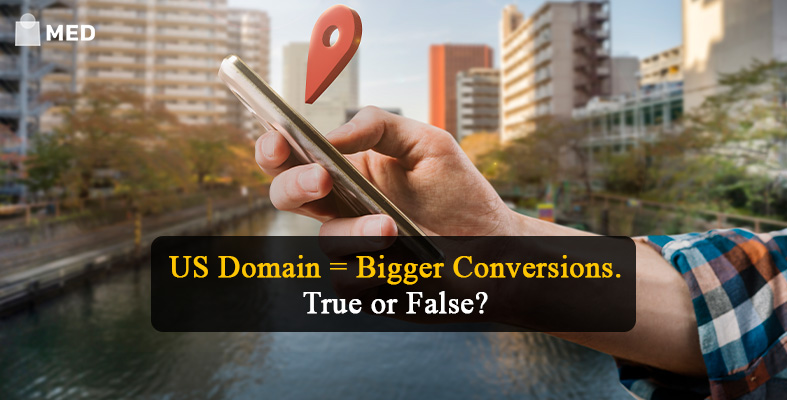TL;DR:
- US-specific domains can boost local visibility and conversions.
- Helps you build trust and relevance with users searching from the USA.
- The SEO impact of country code domains goes beyond visibility as it may also improve click-through rates.
- While not mandatory for rankings, it offers a competitive edge in local SEO.
Have you nailed your on-page SEO, perfectly optimized the Google Business Profile, and curated the quality backlinks with high DA and low spam score, but still struggling to rank locally? Your domain name is something that you might be missing.
This is often overlooked, but using country-specific domains, also known as country code top-level domains (ccTLDs), can influence the local search results. These are the extensions assigned to a particular country, like. .in for India, .us for the United States of America, .ng for Nigeria, .ca for Canada, and so on. Let’s say you want to rank across the USA. Using the .us domain for local SEO may influence your rankings more than you think.
In this blog, we will look into the SEO impact of country code domains and decode whether it really leads to higher conversion rates.
Wondering if it’s time to switch to a country-specific domain? Let’s find out.
Also Read: Hostinger Coupon Codes 2025 – Best Discounts & Deals
How Country-Code Domains Influence Local SEO & Audience Trust in the US and UK
Selecting the right domain extension can be more than just a branding decision. It can truly impact how search engines rank your website and how much users trust it. Here is a breakdown of how a country-specific domain can influence your SEO and user behavior.
Search Engine Preferences: How Google Treats .us Domains
Using country-code top-level domains (ccTLDs) means you are letting search engines like Google learn about your target audience. If your website domain is www.abc.us, then Google will automatically associate it with the respective country. This is one of the key benefits of .US domains on SEO.
That’s not to say that generic domains like .com or .org can’t perform well globally. However, they often require manual geo-targeting via tools like Google Search Console to position themselves as locally relevant.
ccTLDs handle this task independently.
Audience Behavior: Trust Signals from Local Domains
Whether it’s local people, local vendors, or local domain, we all trust local things easily, and so do the online visitors to the local domain. Visitors are more likely to click and convert when they see a domain that feels familiar and geographically relevant. Local domains increase trust and conversion rates, especially for businesses offering location-specific services or products.
For American users, a .us domain means legitimacy, local support, and faster shipping or service. This psychological nudge can make a big difference when your website appears in a competitive search results page.
With ccTLDs, you can expect users to subconsciously trust what feels “local” to them before they even land on your site.
Conversion Rates: Does a .US Domain Actually Perform Better?
Businesses can generally expect a spike in conversion rates with local domains. However, this remains conditional.
There is no denying that the .us domain can increase conversions, but it’s just not the extension that gives the boost. The combination of perceived local relevance, faster loading speeds (if hosted locally), and trust all drives the results.
A .us domain does your first task, attracting the visitor to the website, as it signals this business is homegrown. The rest is determined by the website’s speed, UI/UX, and the products and services it offers.
Global vs Local: When to Choose .com Over .us
So, should you choose a .com or .us domain? Here’s what to consider:
- Choosing .com domains is ideal if you want to reach a global audience. They are widely recognized, trusted, and perfect if your business serves an international audience.
- Choosing .us domains is perfect when you want to rank in search engines and build trust with region-specific audiences.
Targeting business in the USA or looking to shift to .us domain? You can explore GoDaddy coupon codes and choose the domain with exclusive discounts or perks.
Conclusion
Whether you are launching a new brand or reevaluating your online presence, selecting the right domain can help you move one step closer to success, positively impacting rankings and conversion rates. To boost local SEO in USA, domains with the .us extension can help you win the trust of local customers and boost your visibility on search engines.
Why overpay for domains when you can have exclusive coupons and deals? Bookmark My Exclusive Deals and be ready to grab discounts on your next domain purchase. Let smart SEO start with smarter deals.
FAQs
1. Is a .us domain worth it?
Yes. It is worth buying a .us domain if you are targeting your business to the American audience. It helps gain local trust, improves regional SEO, and tells search engines that you are relevant to US-based searches.
2. Which domain is better for SEO?
If you are targeting a global reach, .com is ideal. However, for local SEO, country-specific domains like .us or .co.uk are better to boost local search rankings and build stronger geographic relevance.
3. Do domain names matter for SEO?
Yes, domain names impact SEO. Keywords in domains can slightly improve rankings, while relevant extensions like .us signal geographic targeting.
4. Does Google prioritize .com domains?
No, Google doesn’t favor .com domains by default. It ranks domains based on relevance, quality, and location signals. For example, a .us domain can perform better for local US searches.
5. Does a custom domain improve SEO?
Yes, it can. A custom domain name adds credibility and makes your brand easier to remember, which often leads to better click-through rates. While it won’t boost rankings on its own, a custom domain helps set the foundation for better local visibility, stronger branding, and higher chances of getting quality backlinks, all of which support the SEO function.
